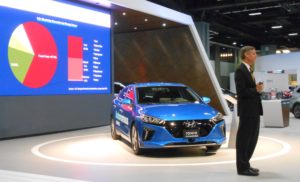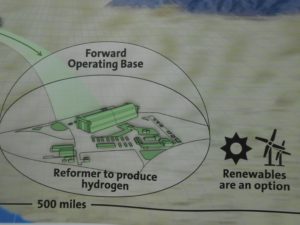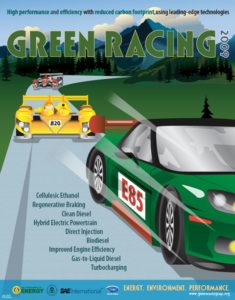by Joanne Ivancic* (Advanced Biofuels USA) Energy use hid in the background of nearly all presentations at the DC Auto Show's 2017 Policy Day whether visions of the future or descriptions of the present or near-term.
 Harman's Dinesh Paliwal flanked by Les Jackson, Washington Automotive Press Association (left) and Scotty Reiss, International Motor Press Association
Harman's Dinesh Paliwal flanked by Les Jackson, Washington Automotive Press Association (left) and Scotty Reiss, International Motor Press Association
It became clear that autonomous vehicles and electric drive trains will require substantial increases in electricity use. Dinesh Paliwal, Chairman, CEO and President of Harman International Industries, made that clear in the opening keynote address when he explained that auto industry "assembly line" jobs of the future will include lots of people in office buildings at computers.
He also extolled the explosive expansion of "cloud" data centers that would be needed to manage the massive amounts of data generated to provide a new transportation experience. These resources will be transmitting enormous amounts of information about each car's environment and travel, not to mention administering vast amounts of personal information about individual drivers from biometrics and personal preferences of seat and wheel positioning to preferred audio and video content.
Some look at this futuristic vision of mobility as "technology in search of a problem" while others take it for granted as the logical continuation of our connected society.
Regardless, the energy demand cannot be ignored, nor can the source of that energy.
Consider the source.
The natural gas industry should be sponsoring auto shows these day as that sector will be the likely beneficiary of the vision of the future depicted during the presentations throughout. Just as natural gas interests for many years have sponsored the U.S. Department of Energy's Clean Cities initiatives, they should get on board here.
No one, other than the Hyundai presenter, who touted the hoped-for benefits of contradictory concepts of autonomy and connectedness expressed any concern about the fossil fuel-based source of the "zero emission" vehicles' propulsion or power required for extraordinary computer management of vehicle features.
The Hyundai presentation included graphics showing that 67% of US electricity comes from non-renewable, CO2-producing fossil fuel with 20% from nuclear. Not what many would call "clean" energy.
Renewable Fuels? What?
Two additional examples illustrate the lack of appreciation for possible renewable sources of fuel for near-term and current vehicles. First from the U.S. Army; and second from the Jeep presentation.
The Army brought an example of the latest idea to replace Humvee-type equipment, the ZH2 Fuel Cell Electric Vehicle (FCEV) developed and built by General Motors for the Army, featuring new hydrogen fuel cell power.
And how will the Army get that hydrogen? The presenters talked about conversion of JP-8 into hydrogen, and dismissed follow-up questions about the impact that would have on the fully burdened cost of getting the world's most expensive fuel from where it is made to remote parts of the planet for use by soldiers in this high tech buggy.
It took prompting to get them to admit to the possibility of using solar and wind to make hydrogen from local water, even though this renewable hydrogen production possibility was featured in the poster display at the event. This solution to a key problem identified by military experts was barely mentioned, even as an afterthought, during conversations with presenters after the formal presentation. Probably because of its unlikely use in arid lands where JP-8 would be the feedstock of choice.
Then why not just use JP-8 in the truck? Why use that to fuel production of hydrogen? The estimated fully burdened cost to transport fuel to remote areas of engagement reaches $1000/gallon, without considering the loss of life attributed to "just moving fuel." You'd think that addressing, rather than exacerbating, this problem should be a military priority.
One questioner observed that ISIS, for example, has made great strides using Ford and other trucks available from commercial used vehicle markets. Why wouldn't the military take their experience to heart--using a simpler, easy-to-repair vehicle with readily available replacement parts that can operate on relatively available fuel, etc.? Why not use a vehicle that could operate with renewable fuel, as well? It seems to be a successful equipment strategy for some fighting in harsh environments. The Army representatives couldn't or wouldn't provide an answer.
As to Jeep®. On the commercial end of the spectrum, during Q&A after a press briefing about the new Compass by Jeep, the presenter, claiming that he was in sales, not technology, could not say if any Jeep vehicles were designed to use B20 or high ethanol blends such as E85. Audience help came from Allen R. Schaeffer, Executive Director of the Diesel Technology Forum, who found one listed on DTF's website-- the Jeep® Grand Cherokee EcoDiesel which received the 2015 Green SUV of the Year™ award from Green Car Journal. You'd think someone on Jeep's national sales force on the day of the announcement of the 2016 Green Cars of the Year would know.
Certainly, it's good to know that Jeep sells a B20 rated vehicle, but the real point is that sales people from the corporate level to individuals at each dealership should know that they sell vehicles that can use renewable blends. And, they should know enough about those renewable fuels to provide accurate information to customers.
Demise of Government Public/Private Efforts for the Environment
Eco-friendly innovations used to be highlighted and promoted at the DC Auto Show. There was a "technology highway" which seven or eight years ago included massive displays by the US Environmental Protection Agency, Department of Energy and Department of Agriculture featuring efforts to encourage, promote and fund sustainable, renewable transportation alternatives.
This year, without any governmental agencies in evidence, electric vehicles and autonomy were touted as the environmentally conscientious automotive developments. Paliwal of Harman imagined "public private partnerships" would be required to bring about this vision of the future although no representatives of any of those agencies appeared at the DC Auto Show to assure such strong collaborations.
The bottom line
Unless the source of the electricity is renewable, the vision of the future of mobility presented at the DC Auto Show Policy Day will only increase the demand for fossil fuel power. And, if the day of presentations was any indication, serious understanding or concern about truly renewable, sustainable transportation is sorely lacking.
Eyes of enthusiasts of current and future mobility must be opened to enable them to see sustainable, renewable liquid fuels as a solution to environmental problems, as a way to avoid expanding markets for fossil fuels, as a way to avoid environmental and human rights hazards of battery production and attendant cobalt and lithium mining essential to battery production.
It seems that what we can have now, with about 10% of ground transportation already using renewable fuel, with flex fuel vehicles able to use up to 85% renewable fuel, with all diesel potentially converting to 100% renewable diesel or at least 5% biodiesel, going with the status quo provides the "greenest" most human rights supportive path to replacing fossil fuel with renewables for mobility. And when our electricity production becomes renewable, the connected, autonomous environment could be sustainable, too.
Let's see government agencies and private interests who can form the needed public/private partnerships at Policy Day at the DC Auto Show talking about what they are doing to bring about a truly renewable sustainable energy future for all aspects of future mobility.
*Joanne Ivancic serves as executive director of Advanced Biofuels USA.
Nearly 55,000 articles in our online library!
Use the categories and tags listed below to access the nearly 50,000 articles indexed on this website.
Advanced Biofuels USA Policy Statements and Handouts!
- For Kids: Carbon Cycle Puzzle Page
- Why Ethanol? Why E85?
- Just A Minute 3-5 Minute Educational Videos
- 30/30 Online Presentations
- “Disappearing” Carbon Tax for Non-Renewable Fuels
- What’s the Difference between Biodiesel and Renewable (Green) Diesel? 2020 revision
- How to De-Fossilize Your Fleet: Suggestions for Fleet Managers Working on Sustainability Programs
- New Engine Technologies Could Produce Similar Mileage for All Ethanol Fuel Mixtures
- Action Plan for a Sustainable Advanced Biofuel Economy
- The Interaction of the Clean Air Act, California’s CAA Waiver, Corporate Average Fuel Economy Standards, Renewable Fuel Standards and California’s Low Carbon Fuel Standard
- Latest Data on Fuel Mileage and GHG Benefits of E30
- What Can I Do?
Donate
DonateARCHIVES
- February 2026
- January 2026
- December 2025
- November 2025
- October 2025
- September 2025
- August 2025
- July 2025
- June 2025
- May 2025
- April 2025
- March 2025
- February 2025
- January 2025
- December 2024
- November 2024
- October 2024
- September 2024
- August 2024
- July 2024
- June 2024
- May 2024
- April 2024
- March 2024
- February 2024
- January 2024
- December 2023
- November 2023
- October 2023
- September 2023
- August 2023
- July 2023
- June 2023
- May 2023
- April 2023
- March 2023
- February 2023
- January 2023
- December 2022
- November 2022
- October 2022
- September 2022
- August 2022
- July 2022
- June 2022
- May 2022
- April 2022
- March 2022
- February 2022
- January 2022
- December 2021
- November 2021
- October 2021
- September 2021
- August 2021
- July 2021
- June 2021
- May 2021
- April 2021
- March 2021
- February 2021
- January 2021
- December 2020
- November 2020
- October 2020
- September 2020
- August 2020
- July 2020
- June 2020
- May 2020
- April 2020
- March 2020
- February 2020
- January 2020
- December 2019
- November 2019
- October 2019
- September 2019
- August 2019
- July 2019
- June 2019
- May 2019
- April 2019
- March 2019
- February 2019
- January 2019
- December 2018
- November 2018
- October 2018
- September 2018
- August 2018
- July 2018
- June 2018
- May 2018
- April 2018
- March 2018
- February 2018
- January 2018
- December 2017
- November 2017
- October 2017
- September 2017
- August 2017
- July 2017
- June 2017
- May 2017
- April 2017
- March 2017
- February 2017
- January 2017
- December 2016
- November 2016
- October 2016
- September 2016
- August 2016
- July 2016
- June 2016
- May 2016
- April 2016
- March 2016
- February 2016
- January 2016
- December 2015
- November 2015
- October 2015
- September 2015
- August 2015
- July 2015
- June 2015
- May 2015
- April 2015
- March 2015
- February 2015
- January 2015
- December 2014
- November 2014
- October 2014
- September 2014
- August 2014
- July 2014
- June 2014
- May 2014
- April 2014
- March 2014
- February 2014
- January 2014
- December 2013
- November 2013
- October 2013
- September 2013
- August 2013
- July 2013
- June 2013
- May 2013
- April 2013
- March 2013
- February 2013
- January 2013
- December 2012
- November 2012
- October 2012
- September 2012
- August 2012
- July 2012
- June 2012
- May 2012
- April 2012
- March 2012
- February 2012
- January 2012
- December 2011
- November 2011
- October 2011
- September 2011
- August 2011
- July 2011
- June 2011
- May 2011
- April 2011
- March 2011
- February 2011
- January 2011
- December 2010
- November 2010
- October 2010
- September 2010
- August 2010
- July 2010
- June 2010
- May 2010
- April 2010
- March 2010
- February 2010
- January 2010
- December 2009
- November 2009
- October 2009
- September 2009
- August 2009
- July 2009
- June 2009
- May 2009
- April 2009
- March 2009
- February 2009
- January 2009
- December 2008
- November 2008
- October 2008
- September 2008
- August 2008
- July 2008
- June 2008
- May 2008
- April 2008
- March 2008
- February 2008
- January 2008
- December 2007
- November 2007
- October 2007
- September 2007
- August 2007
- June 2007
- February 2007
- January 2007
- October 2006
- April 2006
- January 2006
- April 2005
- December 2004
- November 2004
- December 1987
CATEGORIES
- About Us
- Advanced Biofuels Call to Action
- Aviation Fuel/Sustainable Aviation Fuel (SAF)
- BioChemicals/Renewable Chemicals
- BioRefineries/Renewable Fuel Production
- Business News/Analysis
- Cooking Fuel
- Education
- 30/30 Online Presentations
- Competitions, Contests
- Earth Day 2021
- Earth Day 2022
- Earth Day 2023
- Earth Day 2024
- Earth Day 2025
- Executive Training
- Featured Study Programs
- Instagram TikTok Short Videos
- Internships
- Just a Minute
- K-12 Activities
- Mechanics training
- Online Courses
- Podcasts
- Scholarships/Fellowships
- Teacher Resources
- Technical Training
- Technician Training
- University/College Programs
- Events
- Coming Events
- Completed Events
- More Coming Events
- Requests for Speakers, Presentations, Posters
- Requests for Speakers, Presentations, Posters Completed
- Webinars/Online
- Webinars/Online Completed; often available on-demand
- Federal Agency/Executive Branch
- Agency for International Development (USAID)
- Agriculture (USDA)
- Commerce Department
- Commodity Futures Trading Commission
- Congressional Budget Office
- Defense (DOD)
- Air Force
- Army
- DARPA (Defense Advance Research Projects Agency)
- Defense Logistics Agency
- Marines
- Navy
- Education Department
- Energy (DOE)
- Environmental Protection Agency
- Federal Energy Regulatory Commission (FERC)
- Federal Reserve System
- Federal Trade Commission
- Food and Drug Administration
- General Services Administration
- Government Accountability Office (GAO)
- Health and Human Services (HHS)
- Homeland Security
- Housing and Urban Development (HUD)
- Interior Department
- International Trade Commission
- Joint Office of Energy and Transportation
- Justice (DOJ)
- Labor Department
- National Academies of Sciences Engineering Medicine
- National Aeronautics and Space Administration
- National Oceanic and Atmospheric Administration
- National Research Council
- National Science Foundation
- National Transportation Safety Board (NTSB)
- Occupational Safety and Health Administration
- Overseas Private Investment Corporation
- Patent and Trademark Office
- Securities and Exchange Commission
- State Department
- Surface Transportation Board
- Transportation (DOT)
- Federal Aviation Administration
- National Highway Traffic Safety Administration (NHTSA)
- Pipeline and Hazardous Materials Safety Admin (PHMSA)
- Treasury Department
- U.S. Trade Representative (USTR)
- White House
- Federal Legislation
- Federal Litigation
- Federal Regulation
- Feedstocks
- Agriculture/Food Processing Residues nonfield crop
- Alcohol/Ethanol/Isobutanol
- Algae/Other Aquatic Organisms/Seaweed
- Atmosphere
- Carbon Dioxide (CO2)
- Field/Orchard/Plantation Crops/Residues
- Forestry/Wood/Residues/Waste
- hydrogen
- Manure
- Methane/Biogas
- methanol/bio-/renewable methanol
- Not Agriculture
- RFNBO (Renewable Fuels of Non-Biological Origin)
- Seawater
- Sugars
- water
- Funding/Financing/Investing
- grants
- Green Jobs
- Green Racing
- Health Concerns/Benefits
- Heating Oil/Fuel
- History of Advanced Biofuels
- Infrastructure
- Aggregation
- Biofuels Engine Design
- Biorefinery/Fuel Production Infrastructure
- Carbon Capture/Storage/Use
- certification
- Deliver Dispense
- Farming/Growing
- Precursors/Biointermediates
- Preprocessing
- Pretreatment
- Terminals Transport Pipelines
- International
- Abu Dhabi
- Afghanistan
- Africa
- Albania
- Algeria
- Angola
- Antarctica
- Arctic
- Argentina
- Armenia
- Aruba
- Asia
- Asia Pacific
- Australia
- Austria
- Azerbaijan
- Bahamas
- Bahrain
- Bangladesh
- Barbados
- Belarus
- Belgium
- Belize
- Benin
- Bermuda
- Bhutan
- Bolivia
- Bosnia and Herzegovina
- Botswana
- Brazil
- Brunei
- Bulgaria
- Burkina Faso
- Burundi
- Cambodia
- Cameroon
- Canada
- Canary Islands
- Caribbean
- Central African Republic
- Central America
- Chad
- Chile
- China
- Colombia
- Congo
- Congo, Democratic Republic of
- Costa Rica
- Croatia
- Cuba
- Cyprus
- Czech Republic
- Denmark
- Dominican Republic
- Dubai
- Ecuador
- Egypt
- El Salvador
- Equatorial Guinea
- Estonia
- Eswatini/Swaziland
- Ethiopia
- European Union (EU)
- Fiji
- Finland
- France
- French Guiana
- Gabon
- Georgia
- Germany
- Ghana
- Global South
- Greece
- Greenland
- Grenada
- Guatemala
- Guinea
- Guyana
- Haiti
- Honduras
- Hong Kong
- Hungary
- Iceland
- India
- Indonesia
- Iran
- Iraq
- Ireland
- Israel
- Italy
- Ivory Coast
- Jamaica
- Japan
- Jersey
- Jordan
- Kazakhstan
- Kenya
- Korea
- Kosovo
- Kuwait
- Laos
- Latin America
- Latvia
- Lebanon
- Liberia
- Lithuania
- Luxembourg
- Macedonia
- Madagascar
- Malawi
- Malaysia
- Maldives
- Mali
- Malta
- Marshall Islands
- Mauritania
- Mauritius
- Mexico
- Middle East
- Moldova
- Monaco
- Mongolia
- Morocco
- Mozambique
- Myanmar/Burma
- Namibia
- Nepal
- Netherlands
- New Guinea
- New Zealand
- Nicaragua
- Niger
- Nigeria
- North Africa
- North America
- North Korea
- Northern Ireland
- Norway
- Oman
- Pakistan
- Panama
- Papua New Guinea
- Paraguay
- Peru
- Philippines
- Poland
- Portugal
- Qatar
- Republic of
- Romania
- Russia
- Rwanda
- Saudi Arabia
- Scotland
- Senegal
- Serbia
- Sierra Leone
- Singapore
- Slovakia/Slovak Republic
- Slovenia
- Solomon Islands
- South Africa
- South America
- South Korea (Republic of Korea)
- South Sudan
- Southeast Asia
- Spain
- Sri Lanka
- Sudan
- Suriname
- Sweden
- Switzerland
- Taiwan
- Tanzania
- Thailand
- Timor-Leste
- Togo
- Trinidad and Tobago
- Tunisia
- Turkey
- Uganda
- UK (United Kingdom)
- Ukraine
- United Arab Emirates UAE
- Uruguay
- Uzbekistan
- Vatican
- Venezuela
- Vietnam
- Wales
- Zambia
- Zanzibar
- Zimbabwe
- Marine/Boat Bio and Renewable Fuel/MGO/MDO/SMF
- Marketing/Market Forces and Sales
- Opinions
- Organizations
- Original Writing, Opinions Advanced Biofuels USA
- Policy
- Presentations
- Biofuels Digest Conferences
- DOE Conferences
- Bioeconomy 2017
- Bioenergy2015
- Biomass2008
- Biomass2009
- Biomass2010
- Biomass2011
- Biomass2012
- Biomass2013
- Biomass2014
- DOE Project Peer Review
- Other Conferences/Events
- R & D Focus
- Carbon Capture/Storage/Use
- Co-Products
- Feedstock
- Logistics
- Performance
- Process
- Vehicle/Engine/Motor/Aircraft/Boiler/Ship
- Yeast
- Railroad/Train/Locomotive Fuel
- Resources
- Books Web Sites etc
- Business
- Definition of Advanced Biofuels
- Find Stuff
- Government Resources
- Scientific Resources
- Technical Resources
- Tools/Decision-Making
- Rocket/Missile Fuel
- Sponsors
- States
- Alabama
- Alaska
- Arizona
- Arkansas
- California
- Colorado
- Connecticut
- Delaware
- Florida
- Georgia
- Hawai'i
- Idaho
- Illinois
- Indiana
- Iowa
- Kansas
- Kentucky
- Louisiana
- Maine
- Maryland
- Massachusetts
- Michigan
- Midwest
- Minnesota
- Mississippi
- Missouri
- Montana
- Native American tribal nation lands
- Nebraska
- Nevada
- New Hampshire
- New Jersey
- New Mexico
- New York
- North Carolina
- North Dakota
- Ohio
- Oklahoma
- Oregon
- Pennsylvania
- Puerto Rico
- Rhode Island
- South Carolina
- South Dakota
- Tennessee
- Texas
- Utah
- Vermont
- Virginia
- Washington
- Washington DC
- West Coast
- West Virginia
- Wisconsin
- Wyoming
- Sustainability
- Uncategorized
- What You Can Do
tags
© 2008-2023 Copyright Advanced BioFuels USA. All Rights reserved.





.jpg)





0 COMMENTS
Leave A Comment
Your Email Address wiil not be Published. Required Field Are marked*